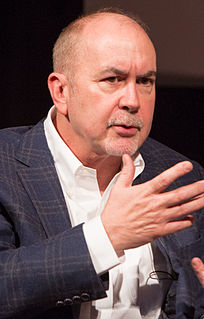A Quote by David Meerman Scott
As financial market players know, advantage comes from reacting to news first. The same thing is true for all companies. When you start the conversation, you are recognised as someone who is plugged into the marketplace of ideas. If you talk about an idea early, you naturally get more exposure because the threads of conversation stem from what you have said. If you're in late you get lost in the cacophony.
Related Quotes
I was in a conversation and someone said: "You know, we were talking about the whole issue of transgender and how it has become so accepted now, and somebody said, 'You know the Oprah show, I think has had a big impact.'" I said, I don't think so. We did several transgender [shows], but we didn't do as much for transgender as I did for, say, abused kids or battered women. And they said, "But no, you started the conversation. You started the conversation and the conversation has led us to here."
"No one is doing what we're doing." This is a bummer of a lie because there are only two logical conclusions. First, no one else is doing this because there is no market for it. Second, the entrepreneur is so clueless that he can't even use Google to figure out he has competition. Suffice it to say that the lack of a market and cluelessness is not conducive to securing an investment. As a rule of thumb, if you have a good idea, five companies are going the same thing. If you have a great idea, fifteen companies are doing the same thing.
If you jump into a market when everyone else is doing the same thing, you're probably too late. On the other hand, if you get into a market early, when it's fundamentally undervalued, then wait for it to become extremely overvalued, and sell once a true top has been established, you should do very well.
Conversations...begin with the sort of imaginative engagement you get when you read a novel or watch a movie or attend to a work of art that speaks from some place other than your own. So I'm using the word 'conversation' not only for literal talk but also as a metaphor for engagement with the experience and ideas of others. And I stress the role of the imagination here because the encounters, properly conducted, are valuable in themselves. Conversation doesn't have to lead to consensus about anything, especially not values; it's enough that it helps people get used to one another.
The moment when someone attaches you to a philosophy or a movement, then they assign all the baggage and all the rest of the philosophy that goes with it to you. And when you want to have a conversation, they will assert that they already know everything important there is to know about you because of that association. And that's not the way to have a conversation.
We should be able to have a conversation about immigration; we should be able to have a conversation about what skills we want to have in the U.K. and whether we need to go out of the U.K. in order to get them to boost our economy, and I don't think we should have a situation where we can't talk about it.
Even if someone doesn't look like you or you don't know people like this in your real life, you get to know them and you get to see their humanity and you get to empathize with them. Our hope is that through empathy that can spark change. We hope people start talking to each other and our show sparks conversation because we need to start talking to each other, not at each other.
One of my top tips for aspiring entrepreneurs: Tell everyone you know about your idea. This runs contrary to the instinct that most people have, because they're afraid someone is going to 'steal my ideal.' Ideas alone are worth very little; it's in the execution and market feedback that companies are made.

































